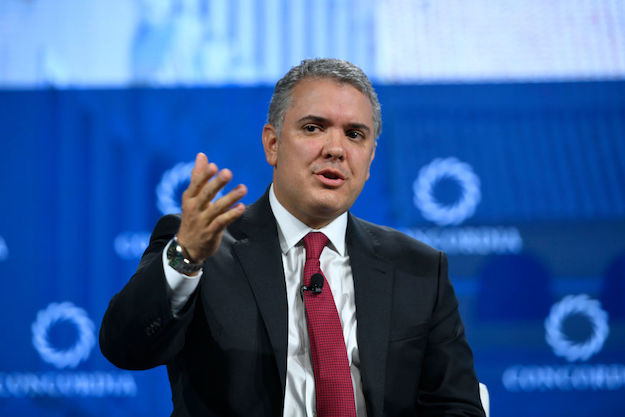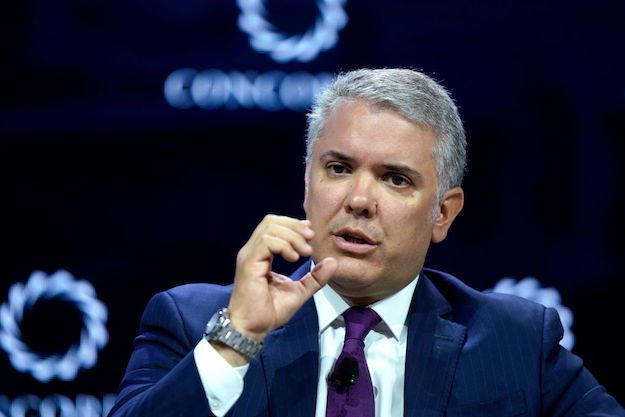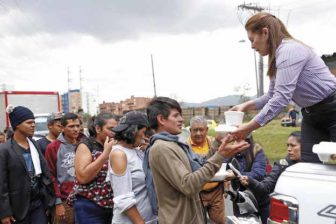BOGOTÁ – Who would have thought that Gustavo Petro and Álvaro Uribe would agree on something?
The leaders of the Colombian left and right, respectively, are united in their opposition to a new tax reform proposal offered by President Iván Duque. As he nears his first 100 days in office, Duque has presented Congress with a tax reform bill that extends the value added tax to a range of basic goods, from bread to oranges.
Uribe offered continued backing for Duque, his longtime protégé, but said that the tax bill would need to be “corrected” before moving through Congress. The rebuke was a reminder that support from Uribe – now a senator and still one of Colombia’s most powerful politicians – comes with conditions.
The widespread criticism also points to the political challenge that Duque, a 42-year-old former Inter-American Development Bank official who served just one term in elected office before becoming president, will face in implementing his business-friendly economic plan.
Long- and short-term economic pressures help explain why Duque, less than three months into his presidency, is willing to spend political capital presenting such an unpopular proposal, said Juana Tellez, chief economist for BBVA Research.
“The proposal is controversial, but for Colombia it’s overdue,” Tellez told AQ.
Indeed, few argue against the need for Colombia to improve its tax system. Despite more than ten different reforms in the last two decades, tax revenue still equals less than 20 percent of the country’s GDP, compared to the OECD average of 34 percent. Duque says millions of high- and middle-income earners avoid paying personal income tax altogether, leaving the private sector to shoulder an unfair share of the burden.
Duque’s bill includes a reduction in the nominal corporate tax rate from 33 percent to 30 percent by 2020. But a budget responsibility law caps the planned fiscal deficit for 2019 at 2.4 percent of GDP, meaning the president also needs to find 14 trillion pesos (about $4.5 billion) in added revenue if he hopes to pay for promised spending on infrastructure, education and other priorities.
To do that, Duque’s bill would gradually reduce the current VAT while extending it to dozens of basic goods that aren’t currently covered. To offset the impact of the tax, more than 4 million low-income Colombian families would receive compensation payments of around 50,000 pesos per month.
Critics say the proposal would hurt a large section of the middle class that doesn’t qualify for compensation but still has trouble making ends meet. Though Duque’s plan calls for an increase in personal income tax for some high earners, the prospect of a sudden rise in the cost of household staples has earned few supporters in Congress.
The administration’s attempts to sell the proposal have been little help. Finance Minister Alberto Carrasquilla came under fire for his absence as debate over the tax reform began, while his deputy faced backlash after seeming to minimize the proposal’s impact on Colombian families in a radio interview. Meanwhile, social media users have been quick to remind Duque of his campaign-trail promises not to raise taxes.
That doesn’t mean the plan is dead. On Wednesday, Duque met with a national unions’ association to discuss potential alternatives for coming up with the needed revenue. Carrasquilla has met with leaders in Congress to try to craft a compromise, though it is unclear to what degree that might include a reversal on the VAT proposal.
Either way, Duque will face a tough congressional fight and his tax bill may end up as more of an opening statement than an ultimatum. Alberto Bernal, chief emerging markets and global strategist at XP Investments, told AQ that Duque “proposed all of heaven, so that he can walk away with a piece of heaven.”
—
Russell is a senior editor and correspondent in Mexico City for AQ









